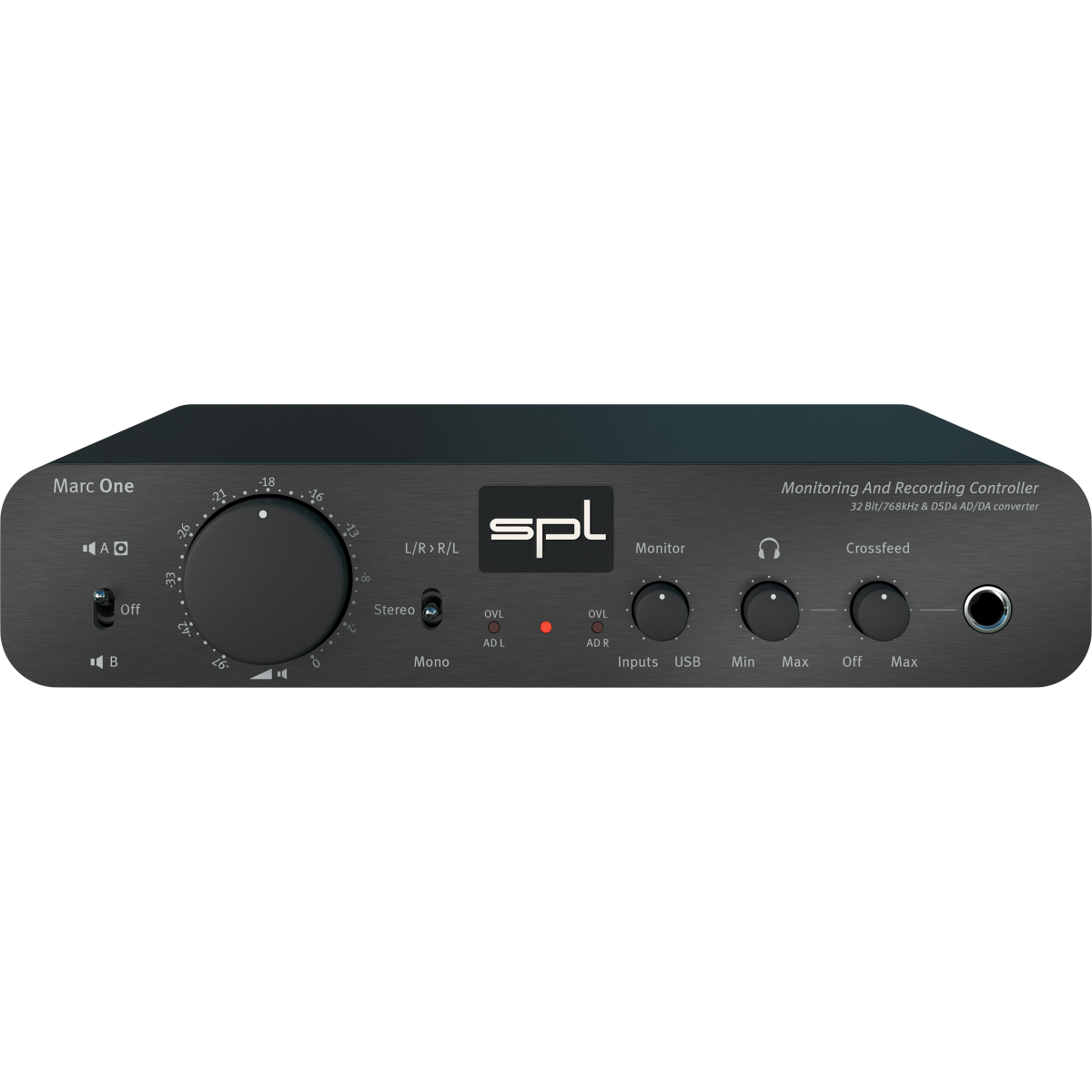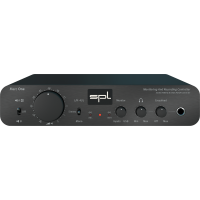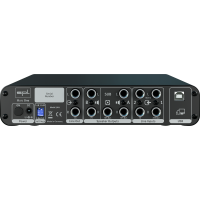- Studio & Recording
- Live Sound
- Room Acoustics
- Software & Plug-ins
- Guitars
- Bass
- Keyboards & Synthesizers
- Microphones
- Drums & Percussion
- DJ Equipment
- Accessories
SPL Marc One - Monitor And Recording Controller
Product Code:
Availability:
Availability:
SPL Marc One
Call for Availability
Call for Availability
Analog inputs & outputs; 6.35 mm (1/4") TRS Jacks
Input gain (max)
+22.5 dBu
Line Input 1 (balanced): Input impedance
20 kΩ
Line Input 1: Common mode rejection
< 60 dB
Line Input 2 (unbalanced): Input impedance
10 kΩ
Output gain (max.): Speaker Outputs (600 Ω)
+22 dBu
Line Output (unbalanced): Output impedance
75 Ω
Speaker Output 1 (balanced): Output impedance
150 Ω
Sub Output low filter
none (full range)
Sub Output (balanced): Output impedance
150 Ω
Speaker Output 2 (unbalanced): Output impedance
75 Ω
Frequency range (-3dB)
10 Hz - 200 kHz
Dynamic range
121.5 dB
Noise (A-weighted, 600 Ω load)
-99 dBu
Total harmonic distortion (0 dBu, 1 kHz)
0.002 %
Crosstalk (1 kHz)
< 75 dB
Fade-out attenuation
-93 dB
USB, 32-Bit AD/DA
USB (B), PCM sample rates
44.1/48/88.2/96/176.4/192/352.8/384/705.6/768 kHz
USB (B), DSD over PCM (DoP), sample rates
2.8 (DSD64), 5.6 (DSD128), 11.2 (DSD256) MHz
0 dBFS calibrated to
15 dBu
Noise (A-weighted, 44.1/48 kHz sample rate)
-113 dBFS
Dynamic range (44,1/48 kHz sample rate)
113 dB
THD + N (-1 dBFS, 10 Hz – 22 kHz)
0.0012 %
Headphones Output; 6.35 mm (1/4") TRS Jack
Wiring
Tip = Left, Ring = Right, Sleeve = GND
Source impedance
20 Ω
Frequency range (-3 dB)
10 Hz - 200 kHz
Noise (A-weighted, 600 Ω)
-97 dBu
THD + N (0 dBu, 10 Hz – 22 kHz, 600 Ω)
0.002 %
THD + N (0 dBu, 10 Hz – 22 kHz, 32 Ω)
0,013 %
Max output power (1 kHz, 600 Ω)
2x 190 mW
Max output power (1 kHz, 250 Ω)
2x 330 mW
Max output power (1 kHz, 47 Ω)
2x 400 mW
Fade-out attenuation (600 Ω)
-99 dB
Crosstalk (1 kHz, 600 Ω)
-75 dB
Dynamic range
117 dB
Internal Power Supply
Operating voltage for analog audio
+/- 17 V
Operating voltage for headphone amplifier
+/- 19 V
Operating voltage for relays and LEDs
+12 V
Operating voltage for digital audio
+3.3 V, +5 V
External Power Supply
AC/DC switching adaptor
Mean Well GE18/12-SC
DC plug
(+) pin 2.1mm; (-) outside ring 5.5mm
Input
100 - 240 V AC; 50 - 60 Hz; 0.7 A
Output
12 V DC; 1.5 A
Dimensions & Weight
W x H x D (width x height incl. feet x depth)
210 x 49.6 x 220 mm
8.23 x 1.95 x 8.66 inch
Unit weight
1.55 kg
3.4 lbs
Shipping weight (incl. packaging)
2 kg
4.4 lbs
The Monitor And Recording Controller
with innovative features and a 32-bit AD/DA converter. A monitor controller with which you can also record. And both in impressive sound quality.
NUMBER ONE IN SOUND
For us the sound is always in the foreground. When it sounds good, we like to listen. To get such a sound, you need experience and technical finesse. We have incorporated both into the Series One.
Speakers & Subwoofer
You can listen to your production via two switchable pairs of speakers. A subwoofer is also switched on and off with speaker pair A.
In the middle position of the switch, the speakers are switched off, which is convenient because you don’t have to turn the volume control back.
Monitor
You can adjust the volume levels at lightning speed with the Monitor knob. In the middle, all input signals are equally loud. To the left, the analog stereo inputs get louder and the USB input signal gets quieter.
Turning from the center to the right does the opposite. So you can quickly and intuitively set the right volume levels.
Line Inputs & USB
Two analog stereo inputs and one digital USB input can be connected to the Marc One. The DAW (Digital Audio Workstation) is preferably connected via USB.
Other players like CD player, mixer, mic preamp, synthesizer or an analog tape machine / tape deck can be connected to the analog line inputs.
32-bit AD/DA Converter
The converter chipset is from AKM’s premium Velvet Sound® series. The AK5552 is used as the analog-to-digital converter and the AK4490 as the digital-to-analog converter.
Both the AD and DA converters offer 32-bit processing. The Velvet Sound® technology makes the finest details audible thanks to its low-distortion architecture.
Sampling frequencies up to 768 kHz PCM (16 times CD resolution) as well as the playback of DSD (via DoP – DSD over PCM) up to a resolution of DSD4 or DSD256 (11.2 MHz) are supported.
This qualifies the Marc One for the highest resolution audio recording and playback currently available.
The USB connection is Class Compliant. This means that all Mac computers and iOS devices like iPads and iPhones can use the full performance bandwidth of the AD/DA converter without driver installation. iOS devices need the Camera adapter.
For Windows, a driver is only needed if higher sample rates are desired. The driver is available for download at the bottom of this page.
Line Out
The Line Out carries the mix between the Line Inputs and USB playback and is controlled by the Monitor knob. The level is unity gain, thus independent of the volume control.
So the Marc One can be looped between devices without “losing” an output.
For example, if several people should listen in via headphones, headphone amplifiers can be connected to the Line Out. But you can also record the signal analog or send it to a mixer for further processing.
Three Monitoring Modes
are offered by the Marc One. In the middle is the default setting “Stereo”. To check the mono compatibility set the switch to “Mono”. The special feature is the channel swap function:
L/R > R/L
reverses the stereo image. L/R becomes R/L. This is important and extremely time-saving when you are searching your sound library for samples in video dubbing that should match a scene with direction of movement.
If the direction is not correct, you usually will have to import the sample into the DAW to swap channels before you can hear and judge if the sample with reversed direction fits to the picture.
With the L/R > R/L function this is no longer necessary. You can now simply swap the direction of movement while pre-listening samples in the library.
The Headphone Power Amp
Poor sound over headphones?
Not enough juice?
Not here. Marc One delivers a rich headphone sound and it can get really loud.
The output stage of the headphone amplifier is designed as a push-pull amplifier in class AB mode. The bipolar transistors share the amplification of the positive and negative half-waves, which produces a higher gain and a higher output voltage than in Class A operation, where only one transistor amplifies both half-waves.
The output stage transistors are thermally coupled and thus run particularly coherently, which contributes to a consistent and stable sound image.
The power supply has a buffer circuit with low source resistance, ensuring generous current reserves even when driving low-impedance headphones.
The Revolution
in the headphone amplifier is the Phonitor Matrix, with adjustable crossfeed, thanks to which you can create mixes with headphones that sound the same on speakers.
The Phonitor Matrix in its largest expansion stage has three parameters: Crossfeed, Speaker Angle and Center Level.
In the Marc One, the center level is preset to -1 dB and the speaker angle to 30°. These are the most commonly used values. The crossfeed function determines the so-called interaural level difference.
The intensity of the crossfeed is fully variable. At the beginning of the control path the crossfeed circuit is not in the audio path. Dialing the control in switches on the crossfeed circuit via relay (hysteresis circuit). The audio signal therefore does not pass through the crossfeed stage if this is not desired.
ProMusicals © 2020
Made with ♡ by iTGS
ProMusicals © 2025










Reviews (0)